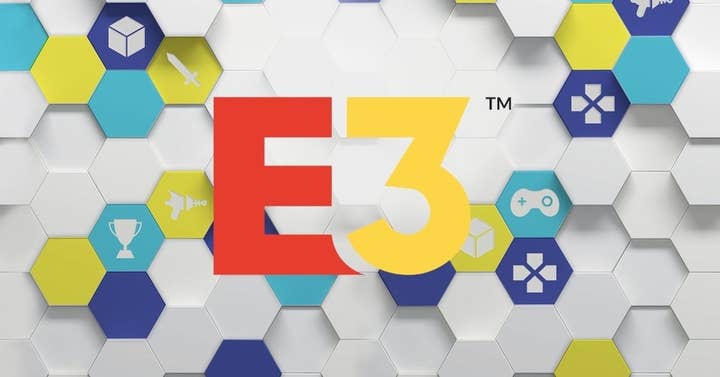Is E3 now too streamlined?
Fancensus analyses the coverage that emerged from this year's E3/Game Fest hybrid and compares to E3 2019 and last year's summer of showcases
Last year marked the first without any form of E3 event since its debut all the way back in 1995 -- a strange absence, for sure, especially for gamers who've come to expect that high level of hype and excitement that usually surrounds the month of June and the show itself.
In its place of sorts were a mishmash of other live streams and shows from publishers, media outlets and other figures within the industry, with a majority of these attached to what Geoff Keighley called the Summer Game Fest.
While the industry would continue to push forwards, gamers saw its efforts as patchy and stretched too thinly across the summer months with heavy-hitting announcements few and far between. It was certainly a far reach from the usual week-long condensed format of a typical E3 that's for sure. Of course, the world was in the midst of a pandemic so teething issues are perfectly understandable, publishers finding their footing and being forced to experiment with different approaches to announcing and showing off their products.
Sure, there is plenty of 'noise' surrounding this year's E3/Game Fest but it's a more muddled 'noise' drowning out focus pieces for individual titles
Despite critical feedback though, the results from an online presence pointed toward an effective approach for publishers with both press and social activity up for announcements on the previous year. You can read more on that in my analysis article from last year. It seemed even with E3 taking a brief hiatus, that the industry was doing just fine on its own.
Now we enter 2021 and with it the return not only of Geoff's Summer Game Fest but also ESA's E3, the pair kicking off in a familiar mid-June slot. Following a year where consumers felt somewhat underwhelmed and even confused by such a spaced-out series of events, 2021 looked to reign things back in to a more traditional and focused approach. In fact, even looking at the Game Fest schedule today reveals just two future events in its upcoming plans.
While the two brands were certainly trumpeting highlights of their own respective shows, actually picking apart what felt like it belonged to what was a rather messy task. While Geoff kicked things off with a live show on Thursday, June 10, the official website would also highlight E3-branded showcases within its schedule too, and with games featuring numerous times across both E3 and Game Fest-tied shows it resulted in something that felt like one giant mixing bowl between the pair. Still, despite a shared space, the streams and shows all fit snuggly within a week.
Interestingly, we can now compare the performance of a physical E3 event with one that is entirely digital. In fact, both E3 2019 and E3/Game Fest 2021 lasted a similar number of days with headlining showcases from the usual suspects including Nintendo, Ubisoft and Xbox/Bethesda. So, how did this compare when it came to press coverage?
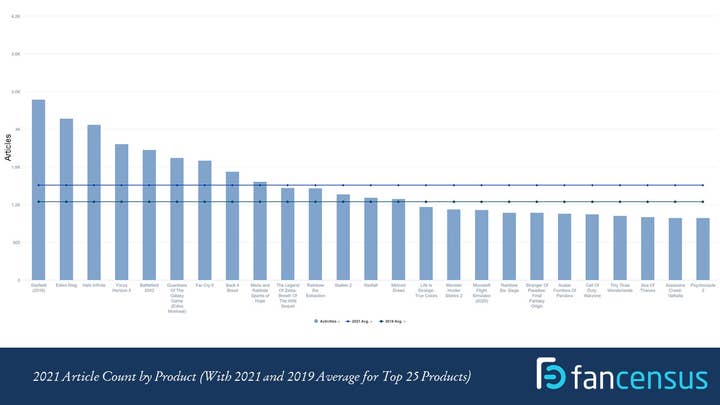
When looking at the top 25 performing titles from both this year's series of shows (Thursday, June 10 and the seven days that followed) and 2019's E3 event (Saturday, June 8 and the seven days that followed), it's clear that 2021 has seen stronger support.
2021's average for its top 25 titles reached as high as 1,500 articles over the seven-day period while 2019 capped at just over 1,200 -- highlighted by the fact more of the top performers for this year kept above both average marks (2019 and 2021). (See figures 1 and 2)
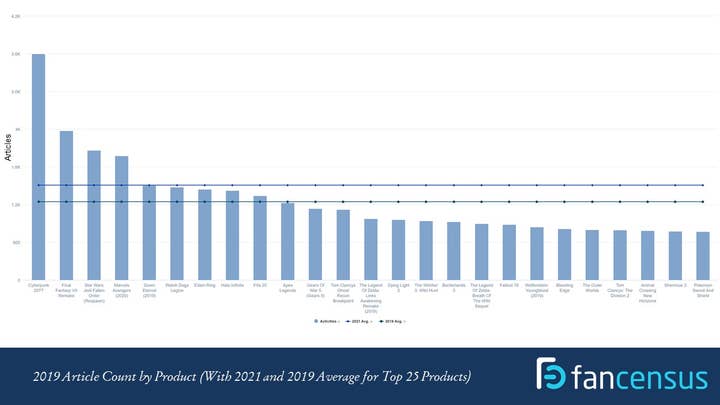
Before we start claiming E3 is officially back, it's important to note that, while press coverage on the whole is up, its quality isn't. Despite an average rise in roughly 300 articles between the two time periods, the number of headlining articles fell in 2021. (See figure 3)
As a result, the share of headlining articles per product for this year is less than half. Compare this with our analysis last year and that gap is even bigger. Another thing to note for this year is that the average output per site a product might receive falls below that of 2019, meaning that while more sites may be reporting on the event, they're offering less content individually. So again, sure, there is plenty of 'noise' surrounding this year's E3/Game Fest but it's a more muddled 'noise' drowning out focus pieces for individual titles.
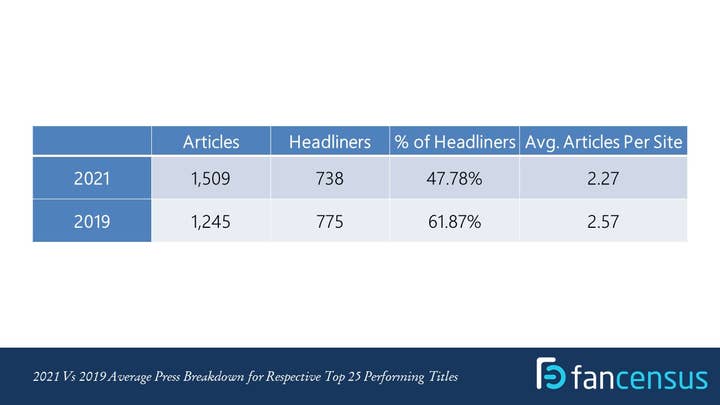
Focusing purely on the debuts of new titles, over the past three years -- E3 2019, announcements made during Summer 2020, and 2021's E3/Game Fest -- there definitely seems to be stronger response from press for those done at digital events in the last two years. In fact, the top five spots are 2020 and 2021 announcements. (See figure 4)
Once again though, the quality of coverage from this year for the most part is lower, focused articles being far outweighed by summary pieces. There is one exception to that rule -- Stranger of Paradise: Final Fantasy Origin -- but more on that later.
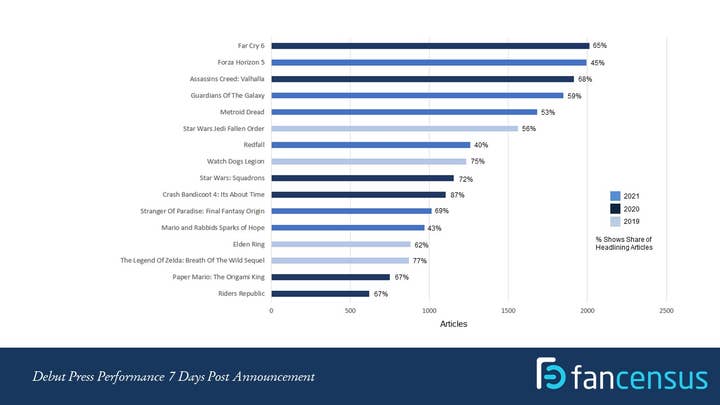
Moving away from press and onto YouTube, the output for the same top performing 25 games from each year highlights an environment where titles have not only been reaching fewer channels this year but also seeing less content produced from them.
This goes for both key influencers and press, the former dropping a massive 41% in terms of video count and the latter an equally eye-opening 39%. (See figure 5)
Interestingly, when it came to owned channels (including platform holder, publisher, developer, brand and IP related channels), videos published and channels reached were similar to the totals from 2019's E3 event.
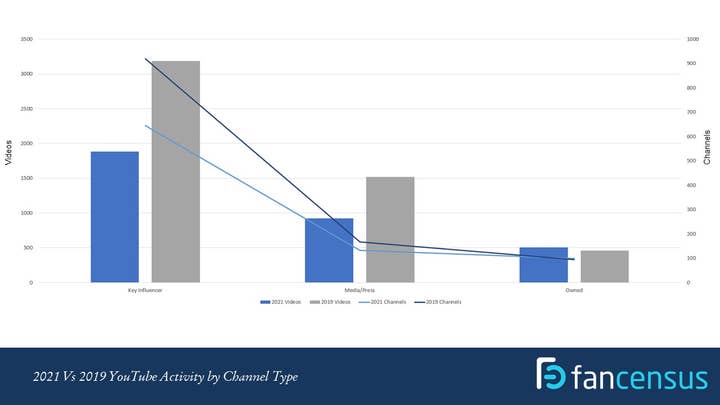
This perhaps highlights a shortcoming when it comes to a fully digital show. The thing with a traditional E3 event is that it was never just about the showcases and conferences; you had the show floor too where press, influencers (and even consumers since 2017) were able to see and more importantly play these games for themselves.
This absence of playable demos and extended footage really leaves an impact on the type of content being produced
While E3/Game Fest this year may have had extended gameplay for a handful of games, opinions are still limited to the video content publishers are willing to produce. As a result, it feels like press and influencers simply didn't have the same resource they might have from playing demos for themselves limiting their output.
So, let's reflect on that for a moment. Does this mean that digital events are a less effective method when it comes to organically creating content opportunities on social platforms? The data would certainly point toward that theory. However, let's not forget that the figures from 2021 come with one major caveat: limited hands-on opportunities. This absence of playable demos and extended footage really leaves an impact on the type of content being produced.
This year, trailers made up for a massive 21% of coverage across press, YouTube, Twitter and Facebook -- only accounting for 13% in 2019. (See figure 6) This dip in trailer-specific coverage isn't because there were fewer trailers during the 2019 event, but rather much more variety with game-specific elements, gameplay and other videos (this includes interviews, watch-alongs and other random types of content) a real driving force when it comes to output. This heavy reliance on trailers in 2021 leaves less opportunity for unique content, not just from Youtube channels but press and other social platforms too.
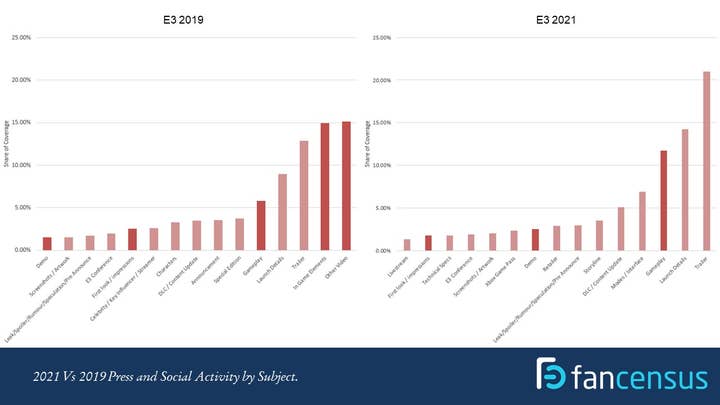
However, rather than circling back to an E3 of old with a physical venue for people to attend and sky-high costs for those attending, why not instead focus on bringing the demos publishers and developers would normally produce to the world digitally?
As exciting as E3/Game Fest is, it needs more than seeing trailer after trailer and a few extended gameplay demos to keep that coverage tailing going longer
It's a method that publishers have utilised before but none more so than Square Enix. Octopath Traveller and Triangle Strategy, for example, both offered playable demos to the public immediately after being shown in Nintendo Directs and, as a result, saw strong support from influencer channels. This year, the publisher attempted the same with Stranger of Paradise: Final Fantasy Origin. Steam Game Festival is another excellent example of combining livestreams with playable demos of the very games being featured in those shows.
It essentially gives the press and influencers something more to sink their teeth into and as a result can lead to higher output. Because as exciting as E3/Game Fest is, it needs more than seeing trailer after trailer and only a lucky percentage of those getting an extended gameplay demo to keep that coverage tailing going longer. A trailer is abrupt. Of course, it will have a strong opening with press and social, but unless you have something more to offer your audience, that focus will steer toward something that does.
In fact, even without all the aforementioned, this year's efforts have resulted in decent figures for its top performers on YouTube when compared with E3 2019. Of the top 15, 2021 claimed six of those spots with Battlefield 2042 only losing out on the top position because it held its own show the day before Game Fest kicked off. If we were to include any coverage on YouTube for the day before then the game capped at an impressive 53 million (placing it above Cyberpunk 2077). Again, these victories show how impactful a digital event can have on a product's campaign. (See figure 7)
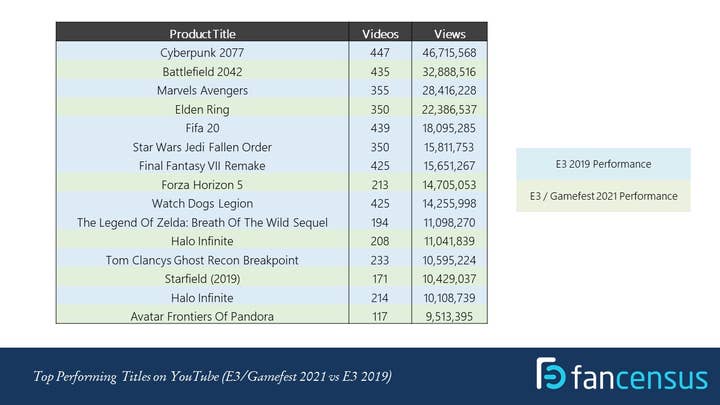
That isn't to say that everyone walked out of this year's E3/Game Fest a winner. The showcases of some publishers merely felt like presence for the sake of presence. Even those that did house the odd interesting and exciting product would sully that by stumbling their way through, their shows uneven, lumpy and fairly accused of heavy padding. That isn't to say that companies shouldn't experiment and produce their own streams, but rather take note of what already exists out there (Nintendo Directs, State of Plays and even indie events like the Wholesome Direct) and what has already been successful.
E3 has always been about the games so less talking and more showing goes a long way
E3 has always been about the games so less talking and more showing goes a long way. If you lack the line-up then perhaps take a knee and use other shows as a means to highlight your one or two gems -- Sega in particular approached things rather smartly by making guest appearances in numerous shows as opposed to spreading its content thinly across a Sega-specific stream.
Those that scored strong press and social awareness from their events did so in a manner not too dissimilar from their E3 2019 performance two years back. In fact, when you line up the last four Ubisoft events (Ubisoft E3 2019, Ubisoft Forward July 2020, Ubisoft Forward September 2020 and Ubisoft Forward E3 2021) side by side, it's clear that Ubisoft's approach to digital streams proves a viable alternative to a presence at a physical show. (See figure 8)
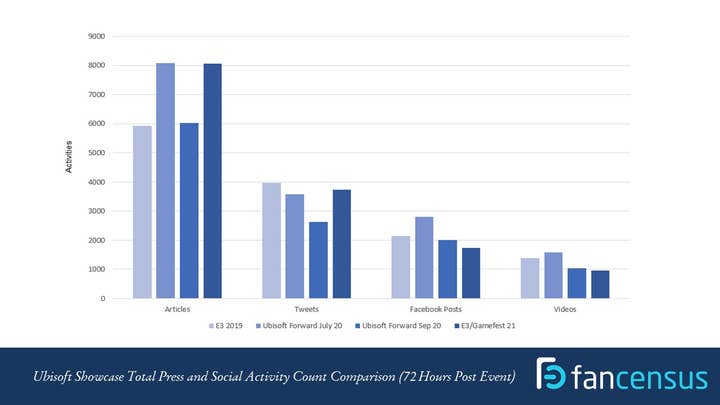
Nintendo, too, would see impressive numbers from its Nintendo Direct event, featuring games achieving similar levels of success as its showcase back in February. (See figure 9)
The outliers (Metroid Dread and Breath of the Wild 2) may have stood high above anything shown in February, but one could argue this comes down to the strength of those brands -- Metroid a long rumoured and long requested franchise while the other a sequel to what many regard as one of the greatest games of all time.
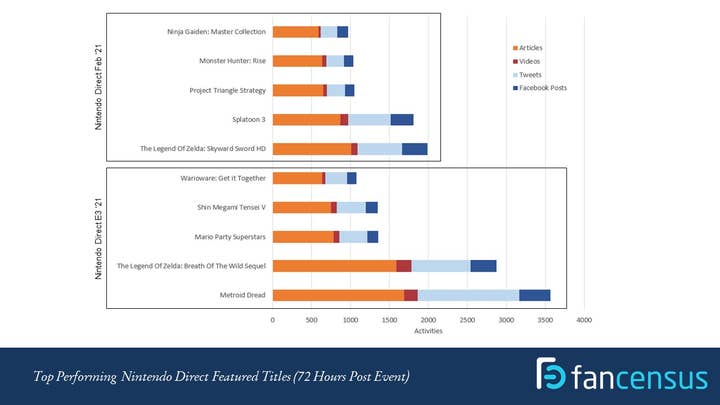
Last year my thoughts that the old E3 we once knew and loved had died, the show desperately needing a 'rising from the ashes' moment caused quite the stir online and... that opinion hasn't changed reflecting on 2021's effort.
While there's still massive room for improvement, the statistics show that a digital summer event (whether that's E3, Game Fest or a Frankenstein hybrid of the two) can work when it comes to drumming up coverage both press and social. Could the numbers be better? Absolutely, and hopefully the lesson learned from this year's event is how to make that happen using the foundation we already have and not an eagerness to revert back to a 2019-esque E3, expenses and all.
